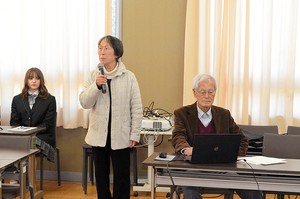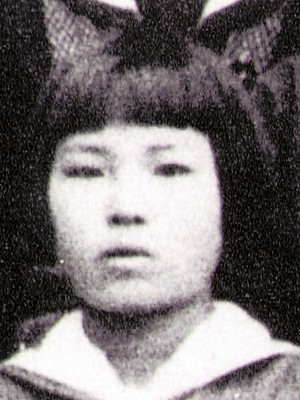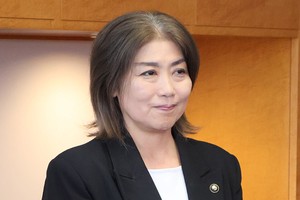THE ASAHI SHIMBUN
November 10, 2022 at 14:01 JST
 Toshimitsu Motegi, secretary-general of the ruling Liberal Democratic Party, right, speaks with Katsuya Okada, secretary-general of the opposition Constitutional Democratic Party of Japan, in the Diet on Nov. 9. (Koichi Ueda)
Toshimitsu Motegi, secretary-general of the ruling Liberal Democratic Party, right, speaks with Katsuya Okada, secretary-general of the opposition Constitutional Democratic Party of Japan, in the Diet on Nov. 9. (Koichi Ueda)
Religious corporations that engage in “heinous soliciting” could face criminal charges under legislation to be submitted to the current Diet session, officials said.
Prime Minister Fumio Kishida earlier announced plans for a bill to ban such groups from making egregious attempts to gain donations.
But it was not clear if the legislation would fall under the Criminal Code.
Toshimitsu Motegi, secretary-general of the ruling Liberal Democratic Party, told reporters on Nov. 9 that violators of the proposed law will be punished.
“They will surely be subjected to administrative penalties, and ultimately, we will consider criminal penalties,” Motegi said.
Earlier in the day, Motegi met individually with his counterparts in four opposition parties--the Constitutional Democratic Party of Japan, Nippon Ishin (Japan Innovation Party), the Democratic Party for the People, and the Japanese Communist Party.
The ruling and opposition parties are discussing legal measures to deal with problems stemming from dubious sales and donation-collection activities of the Unification Church.
The opposition parties have asked the ruling coalition to reveal the contents of the legislation early.
Motegi said the central government might do so next week.
The CDP and Ishin have also strongly called for measures to give “third parties,” such as children or spouses of religious group members, the legal right to cancel related donations made to these organizations.
Motegi said he told the opposition parties that the ruling coalition will consider adding such a clause.
“If dependent children’s rights are impaired because of their parents’ donations, then the children’s right to cancel those donations and claim damages emerges,” Natsuo Yamaguchi, leader of junior coalition partner Komeito, said at a news conference on Nov. 9. “It is also possible for such a right to emerge for spouses.”
(This article was written by Kazuki Uechi and Taro Ono.)




















A peek through the music industry’s curtain at the producers who harnessed social media to help their idols go global.
A series based on diplomatic documents declassified by Japan’s Foreign Ministry
Here is a collection of first-hand accounts by “hibakusha” atomic bomb survivors.
Cooking experts, chefs and others involved in the field of food introduce their special recipes intertwined with their paths in life.
A series about Japanese-Americans and their memories of World War II